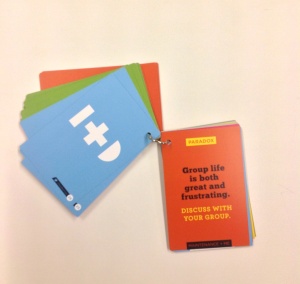Here’s the final of our five post series on group process and collaboration. For context, here are links to the first, second, third, and fourth posts.
Collaboration is never delegation. Instead, it’s a constant negotiation between task and maintenance, between roles and goals, and between humans who want to work together to make positive impact, on each other and their tasks. There’s still thought to be put towards this and activities and language to teach and employ, but these are a few first steps we might take to teach everyone to harness the productive tension in groups in order to accomplish our goals. Here’s my reading list, both past and present, that is helping push the very early foundations of a group dynamics curriculum that you see emerge in this series of posts. Click on each link to be directed towards a short description or the source itself.
Paradoxes of Group Life, by Kenwyn K. Smith (for learning about the central, necessary tensions in groups)
Fierce Conversations, by Susan Scott (for increased knowledge and skills for conversation and collaboration)
Leadership and Design Studio’s Task-Maintenance Cards (pictured above in their prototype versions–not yet available for distribution.)
Gamestorming, by Dave Gray (for a series of ideas and activities to accelerate group process)
The University of Victoria’s Human Resources Department’s Manager’s Toolkit (for more on The Waterline Model)
The University of Pittsburgh’s Speaking Within the Disciplines (for more details on the specific functional task and maintenance roles we might adopt)
The Ten Faces of Innovation, by Tom Kelley and Jonathon Littman (for various group roles we might strive to fulfill)
The Six Thinking Hats, by Edward De Bono (for various group roles we might strive to fulfill)
For anyone who has studied organizational behavior, you’ll know there are even more appropriate professional and academic texts regarding organizational and behavioral management (and please! write them below in the comment section of this blog!). But, with easier reading comes faster experimentation. We won’t grow our ability to facilitate groups (or teach facilitation) but over-preparing.
Instead, drop Task-Maintenance into your next group project, see how your group takes on the language, and make an action plan from there.We’re happy to help facilitate this process (and other group tension creating and mitigating activities)
